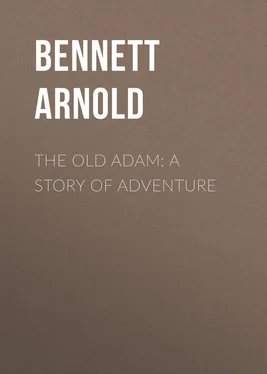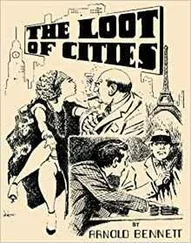Arnold Bennett - The Old Adam - A Story of Adventure
Здесь есть возможность читать онлайн «Arnold Bennett - The Old Adam - A Story of Adventure» — ознакомительный отрывок электронной книги совершенно бесплатно, а после прочтения отрывка купить полную версию. В некоторых случаях можно слушать аудио, скачать через торрент в формате fb2 и присутствует краткое содержание. Жанр: foreign_language, foreign_antique, foreign_prose, на английском языке. Описание произведения, (предисловие) а так же отзывы посетителей доступны на портале библиотеки ЛибКат.
- Название:The Old Adam: A Story of Adventure
- Автор:
- Жанр:
- Год:неизвестен
- ISBN:нет данных
- Рейтинг книги:3 / 5. Голосов: 1
-
Избранное:Добавить в избранное
- Отзывы:
-
Ваша оценка:
- 60
- 1
- 2
- 3
- 4
- 5
The Old Adam: A Story of Adventure: краткое содержание, описание и аннотация
Предлагаем к чтению аннотацию, описание, краткое содержание или предисловие (зависит от того, что написал сам автор книги «The Old Adam: A Story of Adventure»). Если вы не нашли необходимую информацию о книге — напишите в комментариях, мы постараемся отыскать её.
The Old Adam: A Story of Adventure — читать онлайн ознакомительный отрывок
Ниже представлен текст книги, разбитый по страницам. Система сохранения места последней прочитанной страницы, позволяет с удобством читать онлайн бесплатно книгу «The Old Adam: A Story of Adventure», без необходимости каждый раз заново искать на чём Вы остановились. Поставьте закладку, и сможете в любой момент перейти на страницу, на которой закончили чтение.
Интервал:
Закладка:
He said to himself:
"Dashed if I don't write to her every day!"
He leaned out of the window as the train rolled away, and waved and smiled to her, not concealing his sentiments now; nor did she conceal hers as she replied with exquisite pantomime to his signals. But if the train had not been rapidly and infallibly separating them, the reconciliation could scarcely have been thus open. If for some reason the train had backed into the station and ejected its passengers, those two would have covered up their feelings again in an instant. Such is human nature in the Five Towns.
When Edward Henry withdrew his head into the compartment, Brindley and Mr. Garvin, the latter standing at the corridor door, observed that his spirits had shot up in the most astonishing manner, and in their blindness they attributed the phenomenon to Edward Henry's delight in a temporary freedom from domesticity.
Mr. Garvin had come from the neighbouring compartment, which was first-class, to suggest a game at bridge. Messieurs Garvin and Quorrall journeyed to London once a week and sometimes oftener, and, being traders, they had special season-tickets. They travelled first-class because their special season-tickets were first-class. Brindley said that he didn't mind a game, but that he had not the slightest intention of paying excess fare for the privilege. Mr. Garvin told him to come along and trust in Messieurs Garvin and Quorrall. Edward Henry, not nowadays an enthusiastic card-player, enthusiastically agreed to join the hand, and announced that he did not care if he paid forty excess fares. Whereupon Robert Brindley grumbled enviously that it was "all very well for millionaires…" They followed Mr. Garvin into the first-class compartment; and it soon appeared that Messrs. Garvin and Quorrall did in fact own the train, and that the London and North Western Railway was no more than their wash-pot.
"Bring us a cushion from somewhere, will ye?" said Mr. Quorrall casually to a ticket-collector who entered.
And the resplendent official obeyed. The long cushion, rapt from another compartment, was placed on the knees of the quartette, and the game began. The ticket-collector examined the tickets of Brindley and Edward Henry, and somehow failed to notice that they were of the wrong colour. And at this proof of their influential greatness, Messieurs Garvin and Quorrall were both secretly proud.
The last rubber finished in the neighbourhood of Willesden, and Edward Henry, having won eighteen pence halfpenny, was exuberantly content, for Messrs. Garvin, Quorrall, and Brindley were all renowned card-players. The cushion was thrown away, and a fitful conversation occupied the few remaining minutes of the journey.
"Where do you put up?" Brindley asked Edward Henry.
"Majestic," said Edward Henry. "Where do you?"
"Oh! Kingsway, I suppose."
The Majestic and the Kingsway were two of the half-dozen very large and very mediocre hotels in London which, from causes which nobody, and especially no American, has ever been able to discover, are particularly affected by Midland provincials "on the jaunt." Both had an immense reputation in the Five Towns.
There was nothing new to say about the Majestic and the Kingsway, and the talk flagged until Mr. Quorrall mentioned Seven Sachs. The mighty Seven Sachs, in his world-famous play, "Overheard," had taken precedence of all other topics in the Five Towns during the previous week. He had crammed the theatre and half emptied the Empire Music Hall for six nights; a wonderful feat. Incidentally, his fifteen hundredth appearance in "Overheard" had taken place in the Five Towns, and the Five Towns had found in this fact a peculiar satisfaction, as though some deep merit had thereby been acquired or rewarded. Seven Sachs's tour was now closed, and on the Sunday he had gone to London, en route for America.
"I heard he stops at Wilkins's," said Mr. Garvin.
"Wilkins's your grandmother!" Brindley essayed to crush Mr. Garvin.
"I don't say he does stop at Wilkins's," said Mr. Garvin, an individual not easy to crush, "I only say I heard as he did."
"They wouldn't have him!" Brindley insisted firmly.
Mr. Quorrall at any rate seemed tacitly to agree with Brindley. The august name of Wilkins's was in its essence so exclusive that vast numbers of fairly canny provincials had never heard of it. Ask ten well-informed provincials which is the first hotel in London, and nine of them would certainly reply, the Grand Babylon. Not that even wealthy provincials from the industrial districts are in the habit of staying at the Grand Babylon! No! Edward Henry, for example, had never stayed at the Grand Babylon, no more than he had ever bought a first-class ticket on a railroad. The idea of doing so had scarcely occurred to him. There are certain ways of extravagant smartness which are not considered to be good form among solid wealthy provincials. Why travel first-class (they argue), when second is just as good and no one can tell the difference once you get out of the train? Why ape the tricks of another stratum of society? They like to read about the dinner-parties and supper-parties at the Grand Babylon; but they are not emulous, and they do not imitate. At their most adventurous they would lunch or dine in the neutral region of the grill-room at the Grand Babylon. As for Wilkins's, in Devonshire Square, which is infinitely better known among princes than in the Five Towns, and whose name is affectionately pronounced with a "V" by half the monarchs of Europe, few industrial provincials had ever seen it. The class which is the back-bone of England left it serenely alone to royalty and the aristocratic parasites of royalty.
"I don't see why they shouldn't have him," said Edward Henry, as he lifted a challenging nose in the air.
"Perhaps you don't, Alderman!" said Brindley.
" I wouldn't mind going to Wilkins's," Edward Henry persisted.
"I'd like to see you," said Brindley, with curt scorn.
"Well," said Edward Henry, "I'll bet you a fiver I do." Had he not won eighteen pence half-penny? And was he not securely at peace with his wife?
"I don't bet fivers," said the cautious Brindley. "But I'll bet you half a crown."
"Done!" said Edward Henry.
"When will you go?"
"Either to-day or to-morrow. I must go to the Majestic first, because I've ordered a room and so on."
"Ha!" hurled Brindley, as if to insinuate that Edward Henry was seeking to escape from the consequences of his boast.
And yet he ought to have known Edward Henry. He did know Edward Henry. And he hoped to lose his half-crown. On his face and on the faces of the other two was the cheerful admission that tales of the doings of Alderman Machin, the great local card, at Wilkins's-if he succeeded in getting in-would be cheap at half a crown.
Porters cried out "Euston!"
It was rather late in the afternoon when Edward Henry arrived in front of the façade of Wilkins's. He came in a taxicab, and though the distance from the Majestic to Wilkins's is not more than a couple of miles, and he had had nothing else to preoccupy him after lunch, he had spent some three hours in the business of transferring himself from the portals of the one hotel to the portals of the other. Two hours and three-quarters of this period of time had been passed in finding courage merely to start. Even so, he had left his luggage behind him. He said to himself that, first of all, he would go and spy out Wilkins's; in the perilous work of scouting he rightly wished to be unhampered by impedimenta; moreover, in case of repulse or accident, he must have a base of operations upon which he could retreat in good order.
He now looked on Wilkins's for the first time in his life; and he was even more afraid of it than he had been while thinking about it in the vestibule of the Majestic. It was not larger than the Majestic; it was perhaps smaller; it could not show more terra cotta, plate glass, and sculptured cornice than the Majestic. But it had a demeanour … and it was in a square which had a demeanour… In every window-sill-not only of the hotel, but of nearly every mighty house in the square-there were boxes of bright-blooming flowers. These he could plainly distinguish in the October dusk, and they were a wonderful phenomenon-say what you will about the mildness of that particular October! A sublime tranquillity reigned over the scene. A liveried keeper was locking the gate of the garden in the middle of the square as if potentates had just quitted it and rendered it forever sacred. And between the sacred shadowed grove and the inscrutable fronts of the stately houses, there flitted automobiles of the silent and expensive kind, driven by chauffeurs in pale grey or dark purple, who reclined as they steered, and who were supported on their left sides by footmen who reclined as they contemplated the grandeur of existence.
Читать дальшеИнтервал:
Закладка:
Похожие книги на «The Old Adam: A Story of Adventure»
Представляем Вашему вниманию похожие книги на «The Old Adam: A Story of Adventure» списком для выбора. Мы отобрали схожую по названию и смыслу литературу в надежде предоставить читателям больше вариантов отыскать новые, интересные, ещё непрочитанные произведения.
Обсуждение, отзывы о книге «The Old Adam: A Story of Adventure» и просто собственные мнения читателей. Оставьте ваши комментарии, напишите, что Вы думаете о произведении, его смысле или главных героях. Укажите что конкретно понравилось, а что нет, и почему Вы так считаете.











